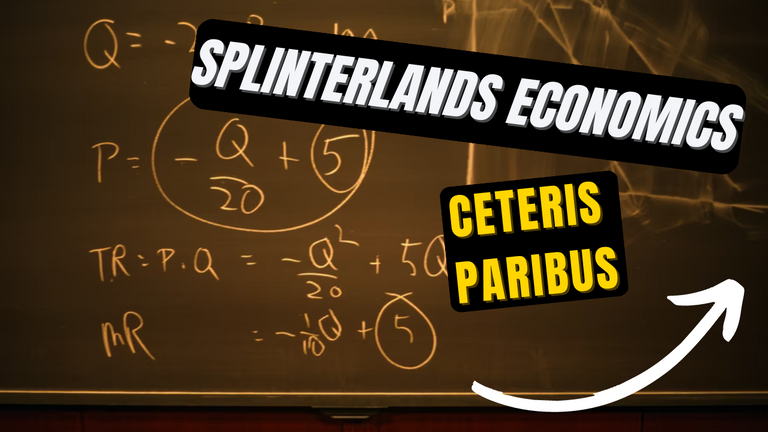Splinterlands Economics: Ceteris Paribus
Hello everyone! We are back again today with another edition of Splinterland Economics - a series in which we introduce a basic economic concept and then apply it to Splinterlands. If this is your first time reading, just to tell you a little bit about myself: my day job is in an unrelated area but I consider myself a little bit of economics nerd - I read a little (or maybe way, way) more news than I should, double majored in econ, and am obsessed with optimization. I love the way Splinterlands is equal parts card game and resource allocation game. My goal with these articles is to share a little bit of what I know with you all.
Our subject today is relevant while determining causality or attempting to analyze the effects of various decisions you may make. Don't be fooled by its use of Latin - this concept isn't limited to scholars or historians, and has significant importance in the modern world. Today, we will be talking about Ceteris Paribus!

What is Ceteris Paribus?
"Ceteris Paribus" is a Latin phrase, meaning "other things equal". By itself the phrase does not have much meaning, but it is a concept which allows us to more accurately discuss the impact of particular choices while describing events or conditions. If we are thinking about performing some sort of action, then we want to look at its effects ceteris paribus - that is, its effects if everything else stays the same.
For example, suppose that we are a small business owner operating a bakery and trying to maximize our profits each month. There are a wide range of factors which may impact our profits - for example, just to make a few - the types of baked goods we have available, the amount of advertising we do, the general condition of the economy, or any nearby competitors. In order to make optimal business decisions we want to know what each factor will do to our business, and here is where ceteris paribus comes into play.
Let's say that we were thinking about paying for additional advertising to try and attract more customers to our bakery. It would be a good decision to buy that advertising if doing so increased our bakery's profit ceteris paribus. That is, if doing so would increase our profit with all other factors staying the same.
Ceteris paribus is helpful because applying it properly can help us to avoid pitfalls caused by other factors or conditions. For example, we may look at one month where we decided to advertise, see our profit decrease, and decide that it was a poor decision. However, we must be careful of whether our observation is ceteris paribus - if a new competitor happened to open their doors for the first time in the same month, then the results of our advertising experiment may not reflect the true value of purchasing additional advertising. Instead, we would want to base our decision off of numbers which isolate the effects of that advertising.
How do we apply it to Splinterlands?
Splinterlands is full of situations in which you must decide between investing your resources in one or more of several different options. Choosing a card to purchase to upgrade your deck, picking a guild building to prioritize next, or choosing which cryptos to stake will all have different impacts on your future earnings potential and net worth. Being able to identify the ceteris paribus benefits of different options gives you a helpful (though by all means, NOT perfect!) metric to use in order to compare the possibilities. For example, calculating the additional ranked battles different additional cards (or card levels) can get you, or estimating the additional brawl victories a guild upgrade may help with, becomes useful in determining which ways are likely to be best for you to spend your money.
A ceteris paribus approach may also be used to analyze other possible decisions - for example, to estimate potential earnings if you were to hit the "promote" button and play in a higher league with the same deck, or if your guild were to move up to a higher brawl tier without recruiting additional players. These cases are particularly interesting, because determining the impact on your results accurately in these cases may allow you to increase your returns without relying on dramatically increasing your investment or "getting lucky" and being able to recruit new players.
Why should we care?
There are countless decisions we must make - in our day to day life, in Splinterlands, or in our investment and business. It is entirely too easy to look at various anecdotal events around us and to make mistaken assumptions about what our best options are. Keeping the concept of ceteris paribus in mind while making these decisions gives us a framework for ensuring that we are making our choices based upon the best possible information.
So the next time you are faced with some evidence or data related to a decision you must make, take a second to look again and check - are your numbers reflecting the impact of your options ceteris paribus? Even if you are not able to get your hands on data reflecting ceteris paribus effects, being aware of the concept allows you to compensate and make adjustments in order to use your best guesses to obtain slightly more accurate numbers.
Thank you so much for reading all the way to the end. Interested in seeing some more of my writing in the future? Be sure to give me a follow! In the meantime, if you'd like to see some of my recent posts:
Splinterlands Economics: Causation - A look at causation, and how we can apply it to Splinterlands!
Lacks Dax - Using Life in Battle! - Last week's battle challenge, featuring the Life splinter!
Splinterlands Economics: Bonds - An overview of bonds, and how we can apply it to Splinterlands!
Thinking about giving Splinterlands a try but haven't signed up yet? Feel free to use my referral link: https://splinterlands.com?ref=bteim, and be sure to reach out to me if you have any questions!
All images used in this article are open source and obtained from Pixabay or Unsplash. Thumbnails borrowed with permission from the Splinterlands team or made in Canva.




https://twitter.com/1467643672636190720/status/1625642548755632128
The rewards earned on this comment will go directly to the people( @bteim ) sharing the post on Twitter as long as they are registered with @poshtoken. Sign up at https://hiveposh.com.
Do you know you can win a Chaos Legion pack just by following some simple steps ?? Check out our Daily Showcase and Participate our latest Giveaway. Thanks
Thanks for sharing! - @alokkumar121
